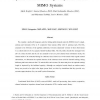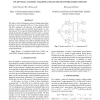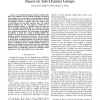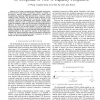52 search results - page 4 / 11 » Capacity Limits of Diffusion-Based Molecular Timing Channels |
CORR
2011
Springer
13 years 4 months ago
2011
Springer
We consider a multi-cell frequency-selective fading uplink channel (network MIMO) from K singleantenna user terminals (UTs) to B cooperative base stations (BSs) with M antennas ea...
SECON
2007
IEEE
14 years 4 months ago
2007
IEEE
— In this paper we study the broadcast capacity of multihop wireless networks which we define as the maximum rate at which broadcast packets can be generated in the network such...
ICASSP
2011
IEEE
13 years 1 months ago
2011
IEEE
We study a multi-cell frequency-selective fading uplink channel from K user terminals (UTs) to B base stations (BSs). The BSs, assumed to be oblivious of the applied encoding sche...
JSAC
2008
13 years 9 months ago
2008
Abstract--In a downlink Orthogonal Frequency Division Multiple Access (OFDMA) system, optimally allocating sub-channels across mobile users can require excessive feedback of channe...
VTC
2010
IEEE
13 years 8 months ago
2010
IEEE
Abstract—It is widely recognized that differential decode-andforward (DDF) cooperative transmission scheme is capable of providing a superior performance compared to classic dire...




